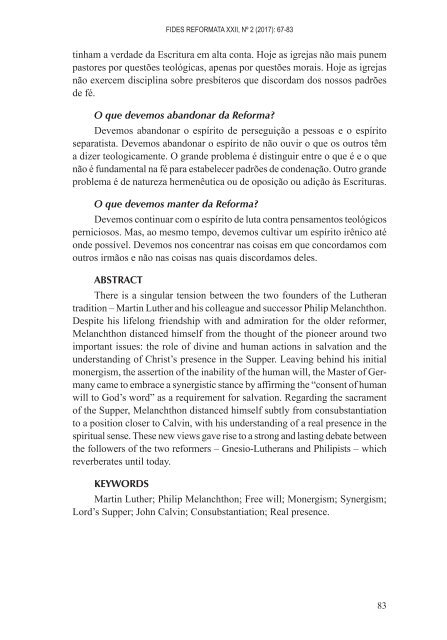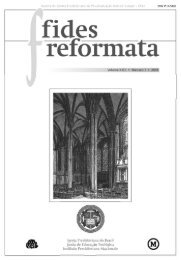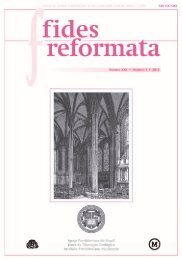Fides 22 N2
Um publicação do Centro Presbiteriano de Pós-graduação Andrew Jumper.
Um publicação do Centro Presbiteriano de Pós-graduação Andrew Jumper.
You also want an ePaper? Increase the reach of your titles
YUMPU automatically turns print PDFs into web optimized ePapers that Google loves.
FIDES REFORMATA XXII, Nº 2 (2017): 67-83<br />
tinham a verdade da Escritura em alta conta. Hoje as igrejas não mais punem<br />
pastores por questões teológicas, apenas por questões morais. Hoje as igrejas<br />
não exercem disciplina sobre presbíteros que discordam dos nossos padrões<br />
de fé.<br />
O que devemos abandonar da Reforma?<br />
Devemos abandonar o espírito de perseguição a pessoas e o espírito<br />
separatista. Devemos abandonar o espírito de não ouvir o que os outros têm<br />
a dizer teologicamente. O grande problema é distinguir entre o que é e o que<br />
não é fundamental na fé para estabelecer padrões de condenação. Outro grande<br />
problema é de natureza hermenêutica ou de oposição ou adição às Escrituras.<br />
O que devemos manter da Reforma?<br />
Devemos continuar com o espírito de luta contra pensamentos teológicos<br />
perniciosos. Mas, ao mesmo tempo, devemos cultivar um espírito irênico até<br />
onde possível. Devemos nos concentrar nas coisas em que concordamos com<br />
outros irmãos e não nas coisas nas quais discordamos deles.<br />
ABSTRACT<br />
There is a singular tension between the two founders of the Lutheran<br />
tradition – Martin Luther and his colleague and successor Philip Melanchthon.<br />
Despite his lifelong friendship with and admiration for the older reformer,<br />
Melanchthon distanced himself from the thought of the pioneer around two<br />
important issues: the role of divine and human actions in salvation and the<br />
understanding of Christ’s presence in the Supper. Leaving behind his initial<br />
monergism, the assertion of the inability of the human will, the Master of Germany<br />
came to embrace a synergistic stance by affirming the “consent of human<br />
will to God’s word” as a requirement for salvation. Regarding the sacrament<br />
of the Supper, Melanchthon distanced himself subtly from consubstantiation<br />
to a position closer to Calvin, with his understanding of a real presence in the<br />
spiritual sense. These new views gave rise to a strong and lasting debate between<br />
the followers of the two reformers – Gnesio-Lutherans and Philipists – which<br />
reverberates until today.<br />
KEYWORDS<br />
Martin Luther; Philip Melanchthon; Free will; Monergism; Synergism;<br />
Lord’s Supper; John Calvin; Consubstantiation; Real presence.<br />
83




